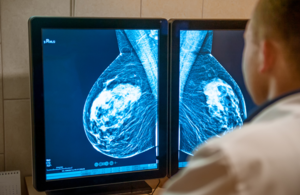New ultrasound technology aims to improve breast cancer diagnosis
The Government Office for Technology Transfer (GOTT) has funded the National Physical Laboratory’s development of new ultrasound technology in breast cancer diagnosis.

An image of a medical professional examining a scan of someone's breast on a screen.
Background
Women with ‘significantly denser’ breast tissue are around 6 times more likely to develop breast cancer than those with ‘low breast density’. Breast density is currently estimated from mammogram and MRI scans, which leaves detection open to clinical judgement and therefore potential room for error.
The knowledge asset solution
The National Physical Laboratory (NPL) is developing innovative new ultrasound technology which provides quantitative measurements of breast tissue composition and has the potential to make a significant impact in breast density assessment. The technology can also help with breast cancer diagnosis and monitoring the response to treatment.
Who will this help?
- Patients: Over 700,000 women in the UK are living with undetected high breast density
- Clinicians: Supporting doctors to identify women with high breast density with safe, consistent and reliable technology available outside of a hospital setting
- NHS: Earlier detection of breast cancer can reduce the cost of treatment and save lives
Funding awards
NPL were awarded £93,954 in the ‘Expand’ phase of the Knowledge Asset Grant Fund (KAGF) in November 2021 and were awarded an additional £199,312 in September 2022 in the ‘Extend’ phase to further develop this technology.
GOTT’s role
GOTT immediately saw the potential for the further development of this public sector owned knowledge asset, and its potential benefits to patients and the healthcare sector. The evidence presented by NPL was strong and an excellent example of how the KAGF can be used to support government bodies to exploit and leverage their knowledge assets and, in this case, improve the diagnosis of cancer.
Quote from NPL
Daniel Sarno, a research scientist at the National Physical Laboratory and a member of the NHS Clinical Entrepreneur Programme, said:
While the technology is currently in the research phase, we are encouraged by our in-person results and excited for the technology journey from bench top to bedside. The Knowledge Assets Grant Fund has enabled us to continue to pursue our vision for getting this technology into the market and used by those who can benefit from it.